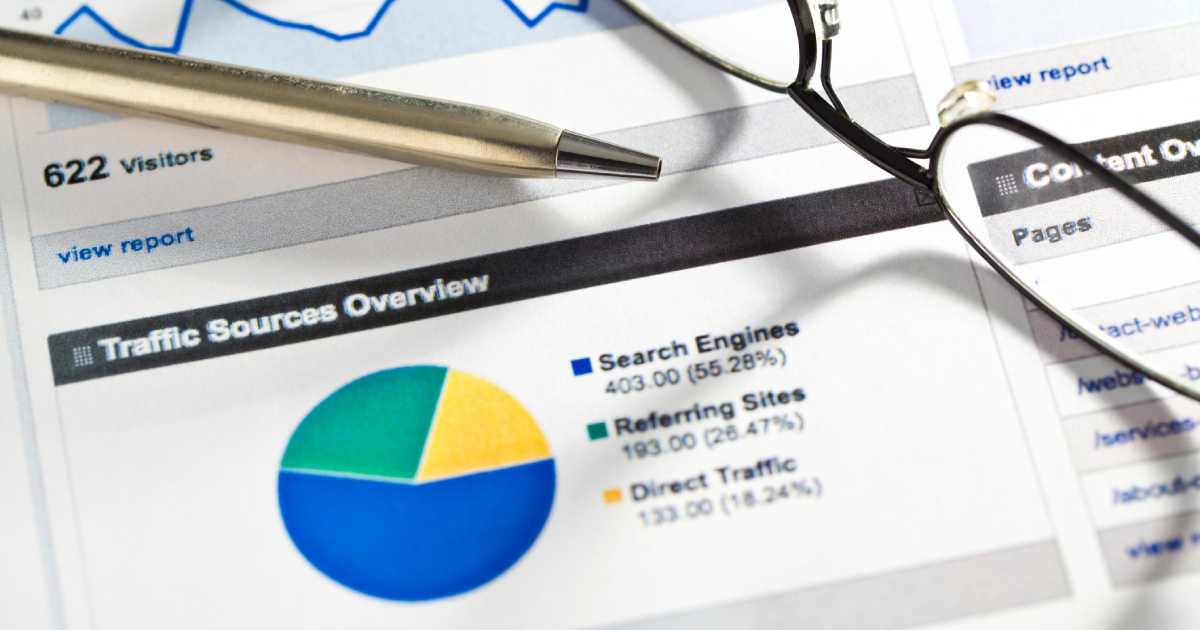Are you struggling to get the results you want from your website’s SEO? You may be investing a great deal of time, effort, and money into developing the content, design, and functionality of your website to create a truly great experience for visitors. However, knowing if you’re hitting the mark can be challenging, especially given how quickly the digital landscape changes. That’s where Google Analytics comes in.
Using Google Analytics can assist website owners in better understanding Search Engine Optimisation (SEO) performance by providing real-time insights on crucial metrics that influence website ranking.
Google Analytics is based on data and metrics that allow you to measure your website’s SEO performance correctly. Therefore, you need to know the primary key performance indicators (KPIs) that you will track in your Google Analytics account. Some essential KPIs we at the Trident team monitor regularly for our clients include organic search traffic, bounce rate, user engagement, click-through rate (CTR), and conversion rate. Let us help you explore how you can use Google Analytics to track your website’s SEO performance, and why it’s so important.
Set Up Your Google Analytics Account and Add Your Website
First things first, you’ll need to ensure you have a Google Analytics account set up and linked to your website. If you haven’t already, create an account and follow the prompts to add your site. Make sure to fill in all the relevant information, including the URL, property name, and time zone. Once your site is verified, you’ll be given a tracking code which you’ll need to add to your website’s HTML code, or use a plugin to add it to your CMS or website builder.
Analysing User Behaviour and Engagement Metrics – How to Track Performance on Google Analytics?
Understanding how your users interact with your website is crucial for optimising your pages and ensuring a positive user experience. Google Analytics provides detailed metrics on user behaviour, such as bounce rate (the percentage of users who leave after visiting only one page), time on page, and pages per session. You can also track engagement metrics, such as social shares and goal completions (e.g., filling out a contact form or making a purchase). By analysing these insights, you can identify areas of your website that may need improvements, and adjust your SEO strategy accordingly. Understanding these KPIs will help you to set clear SEO goals to increase your website’s visibility.
Organic Traffic
One valuable metric to track through Google Analytics is organic traffic. Organic traffic refers to the number of users that reach your website via search engine results pages (SERPs). This does not include paid searches. Analysing the organic traffic metric over time provides essential insights into how your website ranks in SERPs.
An increase in organic traffic represents a higher ranking in SERPs, which is your ultimate goal as a website owner. By understanding which pages and content on your website are attracting organic traffic, you can focus on optimising them further to improve your website’s overall SEO performance.
Bounce Rate
Another crucial metric is the bounce rate. The bounce rate metric measures the percentage of users that leave your website after visiting only one page. An elevated bounce rate could indicate your website content is not relevant to the search query, among other things. By analysing the bounce rate metric, you can track improvements to your website design, content, and user experience to lower your bounce rate and improve your website ranking in SERPs.
Check User Acquisition Metrics
With Google Analytics, you can track and analyse a wealth of SEO data related to user behaviour. One of the key areas to monitor is the acquisition of your website’s visitors. Organic search traffic is a vital channel to track as it is the most significant driver of website visits. In the acquisition section, navigate to channels and identify the percentage of traffic acquired through organic search, social media, direct visits, paid search and referral traffic. It is essential to understand each traffic source’s contribution to make better-informed marketing decisions.
Analyse your Website’s Search Engine Referrals
Tracking your website’s search engine performance is crucial to refining your SEO strategy continually. Determine which search engines drive the most traffic to your site by navigating to the ‘search console’ section of Google Analytics and then to the acquisition and select ‘Search Engine Optimisation.’ From this section, you can extract a range of useful data, from the most popular search queries, total clicks and impressions, to landing pages. Analysing this data provides valuable insights for content optimisation, including updating existing content with the popular keywords used to make these searches.
Measure User Engagement
SEO performance doesn’t just revolve around driving more traffic to your website. The goal is to optimise user engagement, navigating users to the right page to consume relevant content. To measure engagement, turn to the ‘Behaviour’ section within Google Analytics.
In this section, you can measure user behaviour by setting up goals, analysing top-performing pages, overseeing pages with the highest bounce rate, time on page, page views per session and number of sessions. Measuring user engagement helps brands track their website experience, adjust any weaknesses and boost user experience.
The number of pages users view on your website, aka pages per session, is another metric to track in Google Analytics. A higher page-per-session metric typically indicates user engagement. User engagement can positively impact your website ranking in SERPs. By understanding which pages or content on your website are keeping users engaged, you can optimise them further to enhance website performance and attract even more organic traffic.
Monitor Your Website’s Page Speed
Page speed is a critical factor in your website’s SEO performance. A slow-loading website can lead to a high bounce rate, low dwell time, and poor user experience. Google Analytics allows you to monitor your website’s page speed through the Site Speed Report. The Site Speed Report provides you with data on your website’s page load time, including how long it takes to load your website’s pages on different devices and browsers.
Measure Session Duration
The next metric to consider is the average session duration. Average session duration measures the amount of time a user spends on your website. A higher session duration indicates user engagement and satisfaction, which can positively influence your website ranking in SERPs. By monitoring the average session duration, you can optimise your website content, calls to action, and user experience to keep users engaged and attain higher search engine rankings.
Track ROI-driven SEO metrics
Finally, to quantify SEO ROI (Return On Investment), you should track specific performance-based metrics within Google Analytics. Many SEO metrics that can be tracked include trending keywords, total session duration, revenue generated via organic traffic, goal completions and conversions. Tracking these metrics provides insights into the specific value that SEO efforts bring to your business operations.
Conclusion
Google Analytics provides website owners with an abundance of actionable insights into SEO performance, and its utilisation is crucial in tracking it. In our professional experience, we can confirm that improving your website ranking in SERPs requires ongoing optimisation, and implementing data-driven insights obtained from Google Analytics. Therefore, at Trident, we have a dedicated digital marketing team that regularly tracks and analyses SEO performance through Google Analytics as standard practice.
Our team identifies areas that need improvement, refine your SEO strategy, drive more traffic and see your website soar up the search engine rankings. If you’re not using Google Analytics yet, and need assistance, we can help. We at Trident can set up goals, track your ranking keywords, monitor your website’s traffic sources and page speed, and analyse your website’s user behaviour. This can help you improve your website’s search engine rankings, traffic, and revenue. Contact us today for a free consultation, and take your website’s SEO performance to the next level!




